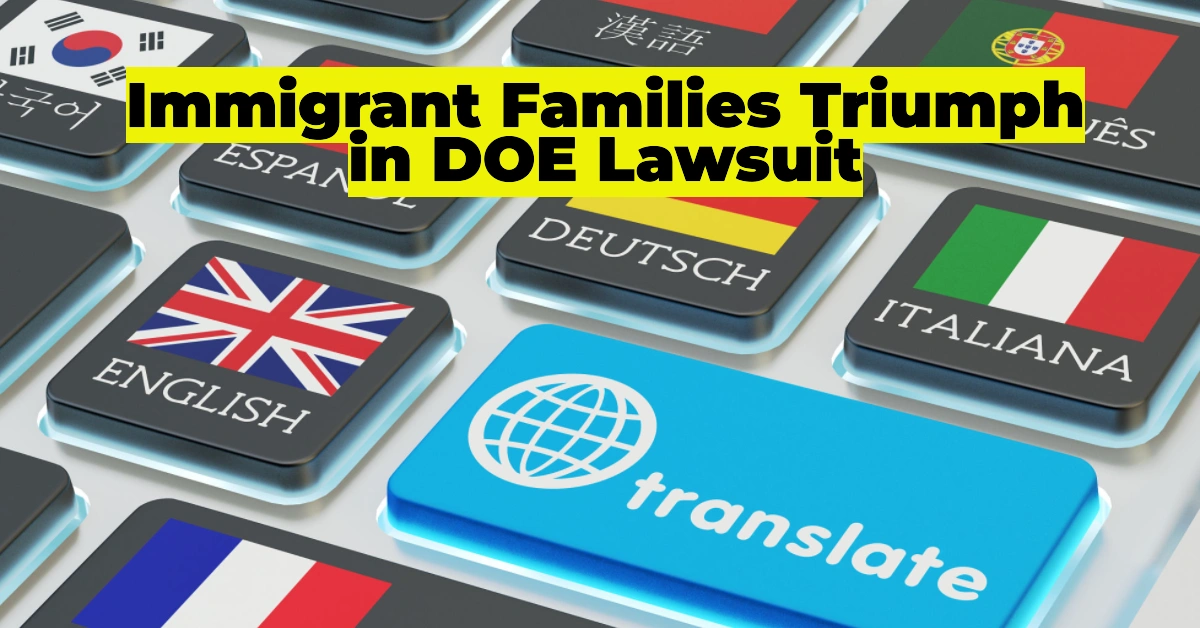In a landmark settlement, the New York City Department of Education (DOE) has agreed to pay over $40,000 to resolve a lawsuit filed by Legal Services NYC on behalf of four immigrant parents with limited English proficiency (LEP). The case, initiated in 2019, claimed that the DOE systematically failed to provide necessary translation and interpretation services, leaving parents unable to make informed decisions about their children’s education.
Table of Contents
Each of the four families involved will receive $11,000 in damages, a victory hailed as a crucial step toward improving educational access for thousands of immigrant families in the city. The case also involved the nonprofit Alliance for Families with Developmental Needs (AFDN), which advocates for families with special needs children.
The Core Issue: Lack of Language Access in NYC Schools
The lawsuit alleged that the DOE violated multiple laws, including:
- Title VI of the Civil Rights Act of 1964, prohibits national origin discrimination by federally funded institutions.
- The Equal Educational Opportunities Act mandates that language barriers must not prevent parents from participating in their child’s education.
- The Individuals with Disabilities Education Act (IDEA), ensures that parents can engage in developing their child’s Individualized Education Program (IEP).
- The NYC Human Rights Law provides additional protections for LEP individuals.
According to the plaintiffs, the DOE’s failure to provide proper translation services resulted in parents being unable to access critical information about their children’s special education services, academic progress, and even emergency medical situations.
The Struggles Faced by Immigrant Parents
Carrie Liu, one of the plaintiffs and a Mandarin-speaking mother of a 14-year-old daughter with autism, recalled harrowing experiences caused by language barriers. In 2018, she received a phone call in English from her child’s bus driver, informing her that her daughter had suffered a seizure and was being taken to the hospital. With a limited understanding of English, Liu was left confused and fearful, unable to get crucial details about her daughter’s condition.
In another instance, her daughter came home with unexplained bite marks. When Liu requested a written explanation, she was instead given a follow-up phone call—in English—which she could not fully comprehend. “I was on edge every day, fearing something would happen to my child at school, but I couldn’t get any specific information due to the language barrier,” Liu said.
Another plaintiff, Marcela Hernandez, a Spanish-speaking mother of a 17-year-old student with autism, requested an interpreter for a school meeting. Instead of providing assistance, a staff member dismissively told her, “Why don’t you learn English?”
DOE’s Commitment to Change After the Settlement
As part of the settlement, the DOE has pledged to implement several key improvements:
- Enhanced Staff Training: DOE staff will receive additional training on providing language access services and understanding parents’ rights.
- Updated Regulations: Clear policies will be established to ensure that LEP parents are informed of their right to translation and interpretation services.
- Tracking and Accountability: The DOE will develop a system to track translation requests, complaints, and language service usage.
- Improved Communication: Schools must proactively inform parents about the availability of free language services.
M’Ral Broodie-Stewart, a senior staff attorney at Legal Services NYC, emphasized that while laws requiring language services have existed for years, poor staff training has often rendered these protections ineffective. “DOE has over 1,600 schools, and some were simply not up to par in providing these essential services,” she noted.
A Step Forward for Immigrant Families in NYC
With over 1.8 million residents in New York City identified as LEP, and 16.3% of students in public schools classified as LEP, the settlement represents a significant victory for immigrant parents. Sim Looi, president of AFDN, believes the changes will benefit thousands of families facing similar challenges.
“As an immigrant mother from Malaysia, I faced the same struggles when I moved to New York,” Looi shared. “Many of our 700+ members struggle to communicate with schools. Sometimes, we feel embarrassed to attend meetings because we don’t understand the teachers and don’t know how to express our needs.”
Legal advocates hope this victory will raise awareness among LEP parents about their right to request translation and interpretation services. AFDN has announced plans to host workshops aimed at educating parents about their rights.
A Call for Systemic Change
For Liu, the legal battle was long, but the outcome was empowering. “As minority groups, we must stand together and speak up so that others can understand our needs,” she said. “Our children deserve their rights and resources, just like any other student.”
The case underscores the broader challenge of ensuring that all parents, regardless of language proficiency, can fully participate in their children’s education. Advocates urge continued vigilance in holding educational institutions accountable for meeting the needs of immigrant families.
With this settlement, immigrant parents in NYC have taken a significant step toward equity in education, ensuring that language is no longer a barrier to their children’s success.
